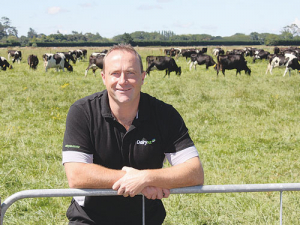NZ Catchment Groups Thrive with ‘Source to Sea’ Approach
The most successful catchment groups in NZ are those that have 'a source to sea' approach.
 MPI's John Roche believes the new version of Overseer can be configured to have an application for both the arable and horticulture sectors.
MPI's John Roche believes the new version of Overseer can be configured to have an application for both the arable and horticulture sectors.
Debate on the value of Overseer, the software tool designed to measure and regulate nutrient loss from farms, continues to rage.
It follows the first overall review of Overseer by a Science Advisory Panel of experts, which questioned the veracity of this tool to be embedded as a definitive regulatory tool. This prompted the Parliamentary Commissioner for the Environment Simon Upton to say that Overseer may have limited application in certain parts of the country, but can no longer be a central pillar of fresh water quality management.
Graeme Wake, Adjunct Professor of Industrial Mathematics and long-time critic of Overseer, says it should be scrapped altogether and is not fit for purpose. However, he concedes that soil science components of Overseer are likely to be solid science and up-to-date.
"Overseer is definitely not suitable as a regulatory tool, which is what the science panel that have just reviewed the tool have said," he told Rural News.
Wake describes Overseer as an overly simplistic approach that does not incorporate temporal 'cause and outcome' effects and system interactions.
He says Overseer relies on averages and in a dynamic system evolving in time the mean or average can be very poor statistics to use.
But Wake's views are not shared by MPI's chief science advisor, Dr John Roche. MPI, along with AgResearch and the Fertiliser Association, are the 'owners' of Overseer.
Roche says the concerns raised by the Science Advisory Panel about nitrate leaching can easily be fixed and says a plan is underway to produce a new and updated version of Overseer in the next 12 months.
He claims Overseer - in its present form and even the revised version - is not and was never intended to be a simple single fix to solve nutrient loss in every part of NZ.
"Think about farming from Cape Reinga to Bluff, from high country station to sea level, from 600 millimetres of rain to six metres of rain, with all the different farming enterprises and all of the different intensities of those farming enterprises - you would struggle to find a model that would do all that," Roche told Rural News.
Unfortunately, not everyone has seen the limitations of Overseer in its present form and as a result it has become embedded in some regional council plans as the main regulatory tool. Roche says it is elevating Overseer to a level that was never intended.
"It is possible that people didn't fully understand modelling and probably believed that Overseer was more accurate than it actually was," he says. "But that doesn't mean that it's not a useful tool and a redeveloped version of it could be a very useful tool. But as one of a suite of tools in helping meet our needs."
In this context - as one of a number of tools - Overseer will naturally fit and play a role in managing and improving fresh water quality. But as a single tool, will not drive regulation. For example, Roche says overland flow paths, which carry phosphorus, sediment and organic nitrogren, need to be managed by separate tools.
He adds, as part of producing the new version of Overseer, industry groups such as horticulture will be consulted to get a better understanding of what problems they have experienced with the tool. Roche believes the new version of Overseer can be configured to have an application for both the arable and horticulture sectors.
"The concept some people have of some single, magical regulatory tool is unrealistic," he adds.
"Thus us really a complicated landscape and what I think came out quite clearly in the panel's report was that one tool is unlikely to be the one and only tool. The approach we are taking is that we will develop a suite of tools that will help regional councils and farmers meet their environmental targets."
Roche believes that the new version of Overseer will be available within a year.
The Meat Industry Association of New Zealand (MIA) today announced that Chief Executive Officer Sirma Karapeeva has resigned from the role.
The winners of the 2026 Hawke’s Bay/Wairarapa Dairy Industry Awards were announced at the annual awards dinner held at Copthorne Solway Park in Masterton on Thursday evening.
Environment Southland is welcoming this week’s decision by the Environmental Protection Authority (EPA) to approve the release of Blaptea elguetai, a leaf‑feeding beetle that will help control the highly invasive Chilean flame creeper.
This March, the potato industry is proudly celebrating International Women’s Day on 8 March alongside the International Year of the Woman Farmer, recognising the vital role women play across every part of the sector — from paddocks and packhouses to research, leadership, and innovation.
Fruit trader Seeka posted a record profit and returns to shareholders in 2025.
Recent weather events in the Bay of Plenty, Gisborne/Tairawhiti, and Canterbury have been declared a medium-scale adverse event.